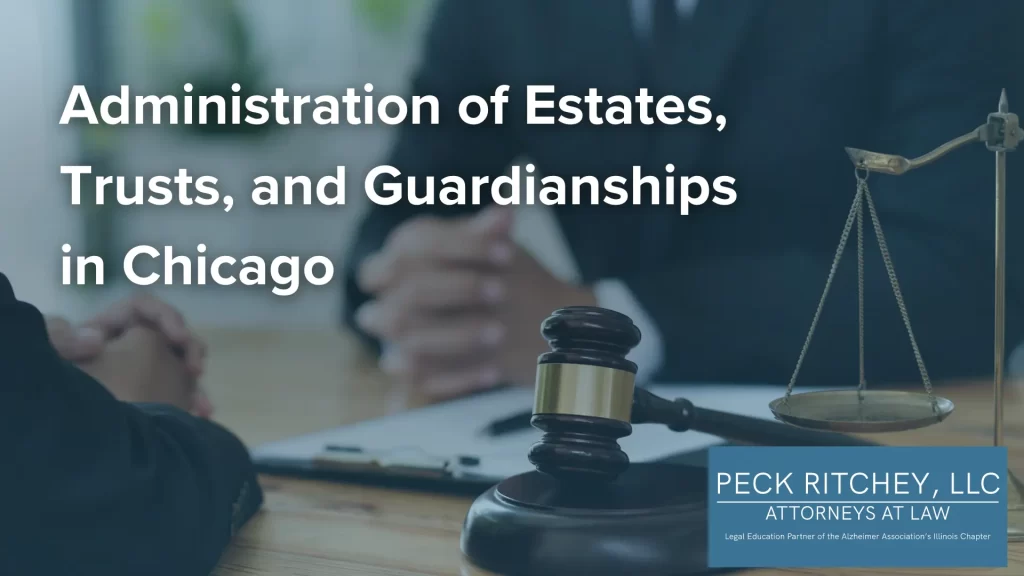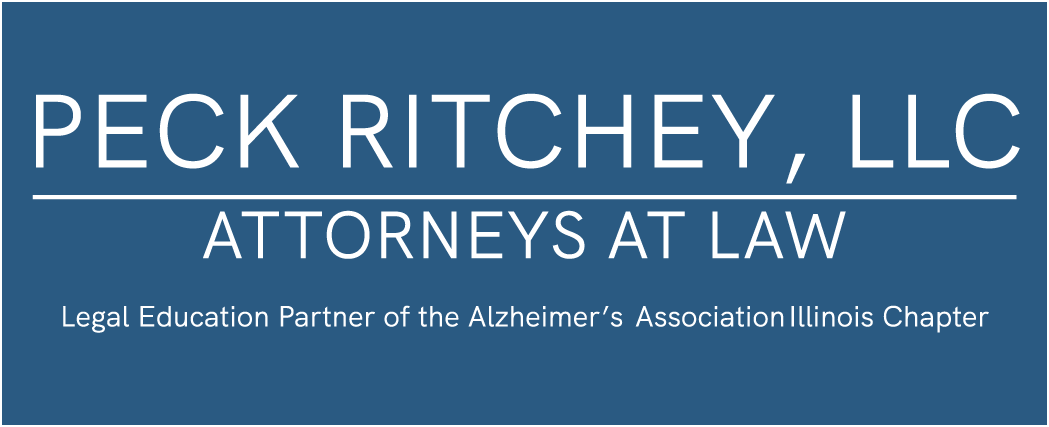
Peck Ritchey, LLC advises fiduciaries charged with the administration of estates and trusts. The estates we administer include decedents’ estates as well as guardianship estates for minors and disabled adults. Estate matters in this vein can get overwhelming for those not already familiar with the administrative process and with estate law in general. Hiring a qualified Chicago attorney, like those at Peck Ritchey, LLC, to handle these matters will ensure that your estate concerns are appropriately and adequately addressed. This will serve to guarantee the best resolution to whatever situation you may be facing. Contact the experienced team at Peck Ritchey, LLC by calling (312) 201-0900.
Decedent Estates
With respect to decedents’ estates, we guide fiduciaries through the probate process. Our attorneys appear in court as required and assist them in transferring assets and resolving claims. Ultimately, this is done to implement the decedent’s estate plan.
We are also prepared to offer our experience and assistance in matters involving:
- Estate Accounting: The process of filing accounting statements with courts and disclosing estate information to beneficiaries.
- Executor Representation arises when there is a dispute during the probate process. These may involve the timeline and initiation of probate, the intent of the deceased, etc.
We routinely prepare required state and federal estate and inheritance tax returns. Our attorneys work in partnership with the estate’s accountants to ensure that fiduciary income tax matters are handled most efficiently. We also design and implement post-mortem planning techniques tailored to a client’s specific circumstances. These aim to minimize and defer future estate taxes and the estate’s income tax liabilities.
Trust Matters Are Complex
 The administration of trusts can become complicated because every state has its rules and processes governing them. Furthermore, certain trusts require different qualifying characteristics and/or limits governed by federal and state laws. Whether you have a trust created in another state, in Illinois, or you need to establish a trust, it is best to have an attorney on your side. You need legal expertise to address these complex documents, the estates they seek to manage, and the individual interests they are meant to protect. Contact the experienced attorneys of Peck Ritchey, LLC today at (312) 201-0900 to ensure your needs are understood, protected, and met with a trust that is right for you and your loved ones.
The administration of trusts can become complicated because every state has its rules and processes governing them. Furthermore, certain trusts require different qualifying characteristics and/or limits governed by federal and state laws. Whether you have a trust created in another state, in Illinois, or you need to establish a trust, it is best to have an attorney on your side. You need legal expertise to address these complex documents, the estates they seek to manage, and the individual interests they are meant to protect. Contact the experienced attorneys of Peck Ritchey, LLC today at (312) 201-0900 to ensure your needs are understood, protected, and met with a trust that is right for you and your loved ones.
For reference, there are various options for the kinds of trusts that may be appropriate for your situation. Some of them include the following:
Living Trusts
Revocable Living Trusts
- Created as a separate trust instrument or document that sets aside assets while you are living
- Managed by a trustee for the benefit of the beneficiaries listed in the trust
- Can be modified with the consent of beneficiaries and trustees
- May be subject to certain tax implications that other living trusts or trust forms are not
Irrevocable Living Trusts
- Usually created as a separate trust instrument or document detailing the initial funding source of a trust. It is limited to the beneficiaries listed in the trust.
- It can lapse or be found void if no property is left in the trust when it is set to vest. That will be different than the time of the creation of the trust. This trust must state the initial property set aside to fund it upon its creation)
- Generally, it cannot be modified once made. That is the point of transferring control of property to a trust and having it managed by a trustee
- The possibility exists for modification if there is cooperation with the trustee and desired handling of the assets is legally permissible. Thus, it may be possible to modify certain aspects of this trust, though it may be difficult.
Testamentary Trusts
Testamentary Trusts
- These trusts are created in a will and do not get funded until the passing of the testator. That is, the individual who created the will is the decedent when the trust vests.
- It is an excellent tool for those who may pass away and leave assets to minors. For example, if you are distributing your estate to a surviving individual and not to surviving individuals per closest generation, etc.
- Great for leaving an estate to a surviving spouse who may need the extra help of a trustee in managing the estate left behind
Supplemental Needs Trusts (aka Special Needs Trusts)
First-Party Supplemental Needs Trusts (aka First-Party Special Needs Trusts)
- Created to set aside assets for a recipient of disability or supplemental Social Security benefits to provide coverage for expenses their limited income does not. Specifically healthcare expenditures.
- The estate is subject to the Medicaid Estate Recovery Program (MERP) upon the death of the beneficiary
- Can be funded by the beneficiary’s property directly. That is useful for beneficiaries who may be receiving public benefits but also receive income from other sources (usually a court settlement)
Third-Party Supplemental Needs Trusts (aka Third Party Special Needs Trusts)
- Created to protect a person who receives Social Security Income (disability or supplemental). this person may be subject to personal income limits to continue receiving public benefits. But not subject to payback provisions usually required by the Medicaid Estate Recovery Program (MERP)
- Can be made for an adult or a minor but cannot be funded directly by the beneficiary
- Helps ensure that there is money left for the disabled beneficiary to cover costs a limited income would otherwise not cover
- Can be a useful tool for relatives who want to leave a disabled beneficiary a gift in their will while not affecting the receipt of Social Security income. It is also useful for any beneficiary who is due a court settlement that would impact their receipt of benefits if received directly.
The above is just a sampling list of possible trusts you may want to incorporate into your estate-planning portfolio. Given the various aspects to consider in trust administration, it is highly recommended that you retain an attorney. Your lawyer can evaluate your and your family’s needs and the role of thorough estate planning in addressing those needs. Call the offices of Peck Ritchey, LLC at (312) 201-0900 to schedule a consultation. Wherever you are in your estate planning journey, we can help you protect the ones you love most.
Why Hire Peck Ritchey, LLC?
Administration of an estate, trust, or guardianship is not easy. Though information on these issues can be found online, some courts may have preferences that are expected and not known to those with little to no experience in this area of law. Many variables exist to address between the individuals involved in these kinds of cases. Whether the parties are a proposed ward and their family members or a decedent’s estate and the creditors seeking debt settlement on that estate, there are many complex issues because of the dynamics these relationships create. Trust an experienced Chicago attorney from Peck Ritchey, LLC to handle these matters efficiently and with the care necessary to ensure the best results for you and your family. Calling Peck Ritchey, LLC today at (312) 201-0900 is the first step to obtaining the best resolution in these matters and finding peace of mind.
